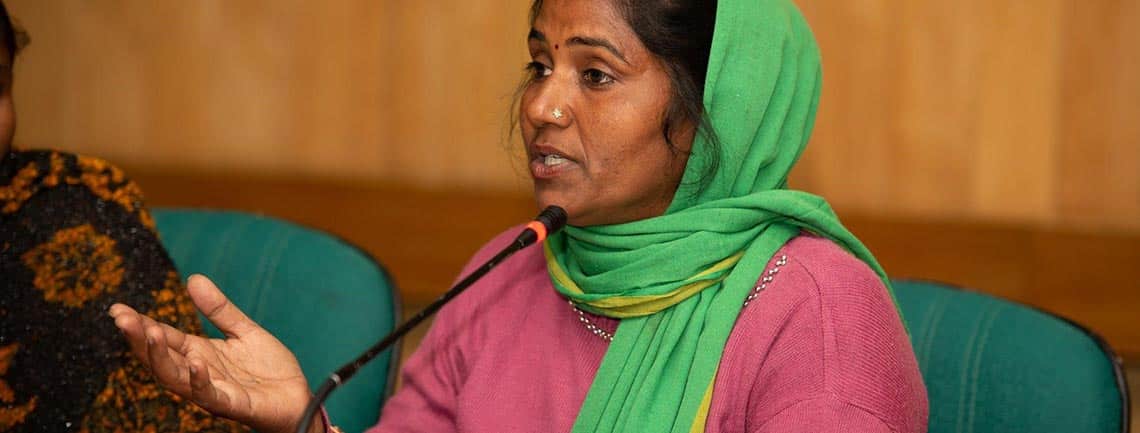Malavika Narayan
July 2020
Photo credit: Rashmi Choudhary
In a room full of strangers, Savita ben starts to tell her story, her voice strong, her gaze sharp. Recalling her journey, her face clouds over remembering the difficulties she has faced. She recounts in a soft but determined manner, her experience of eviction and relocation to Savda Ghevra, almost ten years earlier. Her eyes mist over even today, at the harsh memories.
Her story is one of courage and of rebuilding her and her family’s life; it is a story of her hard work and perseverance in the face of many different challenges. It is a story of the city’s policies robbing her of her livelihood and exposing her to many insecurities and vulnerabilities. It is a story of her fortitude and commitment to make a better life for herself and her family.
Savita ben is a community organiser with the Mahila Housing Sewa Trust (MHT) in Savda Ghevra, a resettlement Colony in Delhi. An eloquent speaker with a soft voice and a determined manner, her story is one of hard work and perseverance in the face of many different challenges.
Born and brought up in a big family in Sultanpuri area of Delhi, she was married at the age of 16 and moved to Paharganj where she was a housewife, not knowing much about work and the outside world. With her husband and father-in-law working good jobs, the family was financially secure.
All of this suddenly changed when their colony was evicted in 2006 and the family was forced to move to Savda, a resettlement colony 40 km away from her home. A payment of Rs.7000 entitled them to a small plot of 12.5 square metres here, which had to be immediately occupied or it would be re-allocated. Savita ben vividly remembers the profound shock she felt when encountering this place.
“There was nothing here at all, just wide expanses of farm land and jungle for as far as we could see. The grass on our plot was as high as my shoulders, the land had not been serviced in any way. There were snakes and insects and I was so terrified all the time. My children were small and I was scared to put them down even for a minute.”
Starting over from zero was very difficult. The family began with nothing but two or three cots and a stone slab to keep their belongings and cook. Initially, there was no water at all and they had to carry water from as far as Ghevra village. There was also no provision for a toilet and they had to go outside.
With no reliable public transport and no nearby sources of livelihood, her father in law went back to Paharganj for work and continued to support them financially during this time. They only had enough savings to last them for a few months and so it was becoming crucial that they find some source of livelihood.
Eventually, she found out that there was work available on the nearby farms. Both Savita ben and her husband began to do this work, for which he earned Rs.100 and she earned Rs.80 for a full day of work. This was, however, very hard labour and it soon began to take a toll on her health. She has since worked various jobs, from construction worker to security guard, to hospital house-keeping and home-based work. Temporarily, she also worked in a nearby factory that made footwear (slippers). However, compulsory overtime and the long commute meant that there was no time to look after her children or do her domestic chores.
Amidst all this, Savita ben and her husband also slowly began to build their house. Like others in the colony, the change from kutcha to pucca has been a long-drawn out process over a period of ten years.
In 2008, MHT began work in the community and helped with micro-loans for the community to construct toilets and install water motors. They used to hold community meetings and she learned of them from her daughter. With their help, she was also able to get a loan to build a toilet and put in a water motor in her home.
Savita ben describes her engagement with MHT with great enthusiasm, especially about the many things women are made aware of during the organisations’ community meetings. Before this, women did not know about their rights from the state and who to approach for getting access to basic services. For the past nine months, she has been working as a part of the staff and is responsible for the holding of meetings in different blocks, listening to women’s problems and applications, and for keeping the work going smoothly in the community.
Despite having to navigate tensions at home, Savita ben is happy with her newer, confident self and is determined to continue her work. In spite of facing many challenges, like domestic conflict, the necessity to earn and put her children through higher education and marriage, and looking after the household, Savita ben is now confident that she can survive anything. Looking back at her journey from a shy housewife, to someone who confidently advocates for her community now, Savita ben considers her biggest achievement to be the ability to find work and demand to be paid appropriately for it. Her own contribution along with her husband’s in building their house and making ends meet is one she states with pride.
